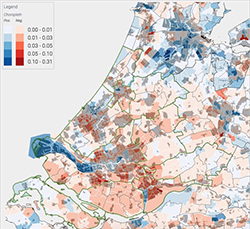 A few years ago Ton van Raan, emeritus professor of Quantitative Science Studies at CWTS, demonstrated that universities show a similar scaling behavior as cities in the distribution of the ‘gross university income’ in terms of total number of citations over ‘size’ in terms of total number of publications. Moreover, the power law exponents for university scaling are comparable to those for urban scaling.
A few years ago Ton van Raan, emeritus professor of Quantitative Science Studies at CWTS, demonstrated that universities show a similar scaling behavior as cities in the distribution of the ‘gross university income’ in terms of total number of citations over ‘size’ in terms of total number of publications. Moreover, the power law exponents for university scaling are comparable to those for urban scaling.
Stimulated by a growing political interest, the focus of the research shifted to urban scaling. Last week the final report on urban scaling and its relation with governance structures was made public by the South Holland provincial government. The four large urban agglomerations in the province of South-Holland, Rotterdam, The Hague, Leiden and Dordrecht function far from optimal. The urban networks within these agglomerations are insufficiently linked to each other, causing socio-economic damage. This is the conclusion drawn by Ton van Raan, together with the professors Frank van Oort (Erasmus University Rotterdam) and Pieter Tordoir (University of Amsterdam). They investigated how the spatial structure, economic performance and administrative organizations influence each other in the province, commissioned by the province of South-Holland. Their research shows that the municipal boundaries create all kinds of limitations due to insufficient administrative, social and cultural cohesion and synergy. This applies, for example, to housing, infrastructure and socio-economic partnerships.
Within an urban agglomeration, the separate municipalities of the central city and of the suburbs are complex socioeconomic networks that are insufficiently linked to each other. As a result, there are fewer connections within a compact urban area and this is hampering facilities, economic activities and creative initiatives. The situation in Zuid-Holland is not exclusive. The same pattern is also found elsewhere in the Netherlands and in Germany. Urban areas are socio-economic stronger if they fall under one municipal authorities than if an urban area of comparable size has several municipal authorities. Provincial Executive Jeannette Baljeu of the province of South Holland said in a response to the report that the conclusions in the studies make it clear that we are faced with a strong challenge and that collaboration is necessary and that she will start discussions with the municipalities with the major urban agglomerations how we can remove obstacles to strengthen cooperation across borders.

